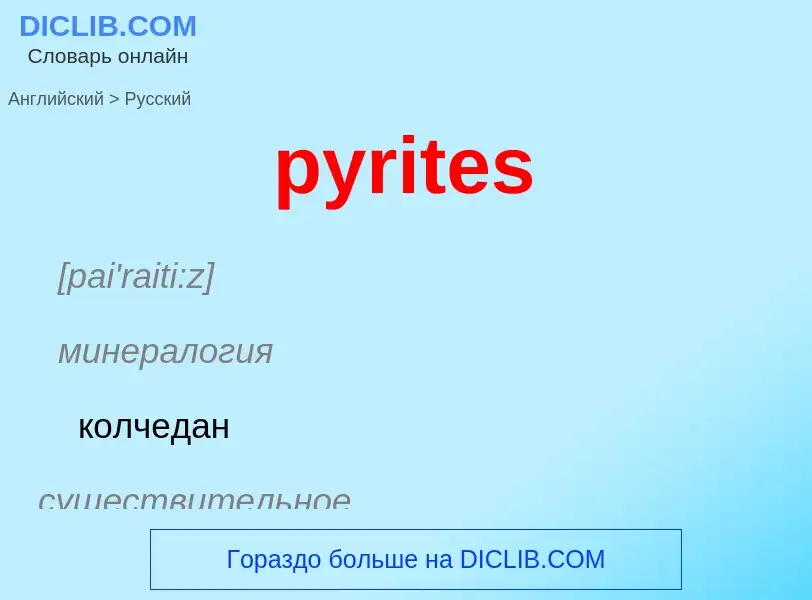Übersetzung und Analyse von Wörtern durch künstliche Intelligenz ChatGPT
Auf dieser Seite erhalten Sie eine detaillierte Analyse eines Wortes oder einer Phrase mithilfe der besten heute verfügbaren Technologie der künstlichen Intelligenz:
- wie das Wort verwendet wird
- Häufigkeit der Nutzung
- es wird häufiger in mündlicher oder schriftlicher Rede verwendet
- Wortübersetzungsoptionen
- Anwendungsbeispiele (mehrere Phrasen mit Übersetzung)
- Etymologie
pyrites - Übersetzung nach russisch
[pai'raiti:z]
минералогия
колчедан
существительное
общая лексика
серый колчедан, пирит
минералогия
сернистые металлы
['pai(ə)rait]
общая лексика
колчедан
колчедановый
пирит
пиритовый
существительное
минералогия
пирит
железный колчедан
Definition
Wikipedia

The mineral pyrite (), or iron pyrite, also known as fool's gold, is an iron sulfide with the chemical formula FeS2 (iron (II) disulfide). Pyrite is the most abundant sulfide mineral.
Pyrite's metallic luster and pale brass-yellow hue give it a superficial resemblance to gold, hence the well-known nickname of fool's gold. The color has also led to the nicknames brass, brazzle, and Brazil, primarily used to refer to pyrite found in coal.
The name pyrite is derived from the Greek πυρίτης λίθος (pyritēs lithos), 'stone or mineral which strikes fire', in turn from πῦρ (pyr), 'fire'. In ancient Roman times, this name was applied to several types of stone that would create sparks when struck against steel; Pliny the Elder described one of them as being brassy, almost certainly a reference to what we now call pyrite.
By Georgius Agricola's time, c. 1550, the term had become a generic term for all of the sulfide minerals.
Pyrite is usually found associated with other sulfides or oxides in quartz veins, sedimentary rock, and metamorphic rock, as well as in coal beds and as a replacement mineral in fossils, but has also been identified in the sclerites of scaly-foot gastropods. Despite being nicknamed "fool's gold", pyrite is sometimes found in association with small quantities of gold. A substantial proportion of the gold is "invisible gold" incorporated into the pyrite (see Carlin-type gold deposit). It has been suggested that the presence of both gold and arsenic is a case of coupled substitution but as of 1997 the chemical state of the gold remained controversial.



![[[Pyritohedron]]-shaped crystals from Italy [[Pyritohedron]]-shaped crystals from Italy](https://commons.wikimedia.org/wiki/Special:FilePath/Pyrite elbe.jpg?width=200)

![An abandoned pyrite mine near [[Pernek]] in [[Slovakia]] An abandoned pyrite mine near [[Pernek]] in [[Slovakia]]](https://commons.wikimedia.org/wiki/Special:FilePath/Stolna pri Perneku.jpg?width=200)
![As a replacement mineral in an [[ammonite]] from France As a replacement mineral in an [[ammonite]] from France](https://commons.wikimedia.org/wiki/Special:FilePath/Bullypyrite2.jpg?width=200)



![Paraspirifer bownockeri]]'' in pyrite Paraspirifer bownockeri]]'' in pyrite](https://commons.wikimedia.org/wiki/Special:FilePath/Paraspirifer bownockeri.fond.jpg?width=200)


